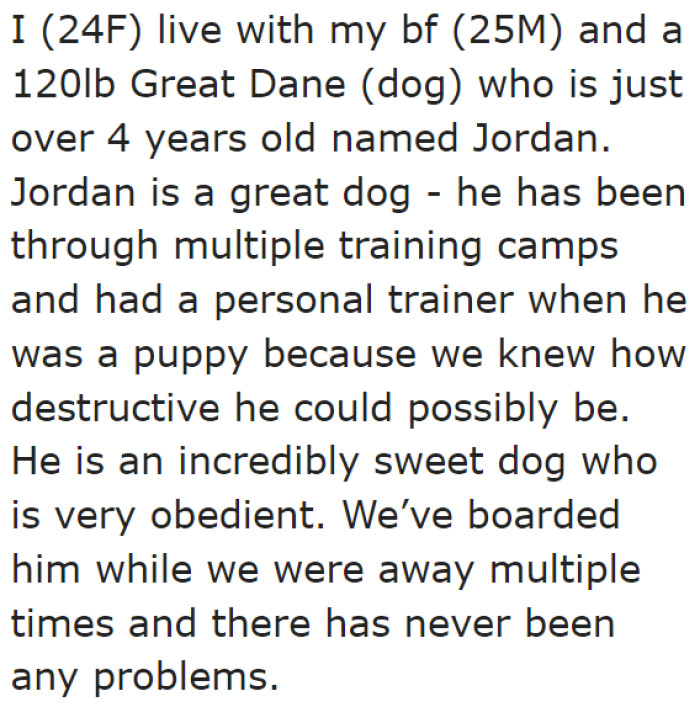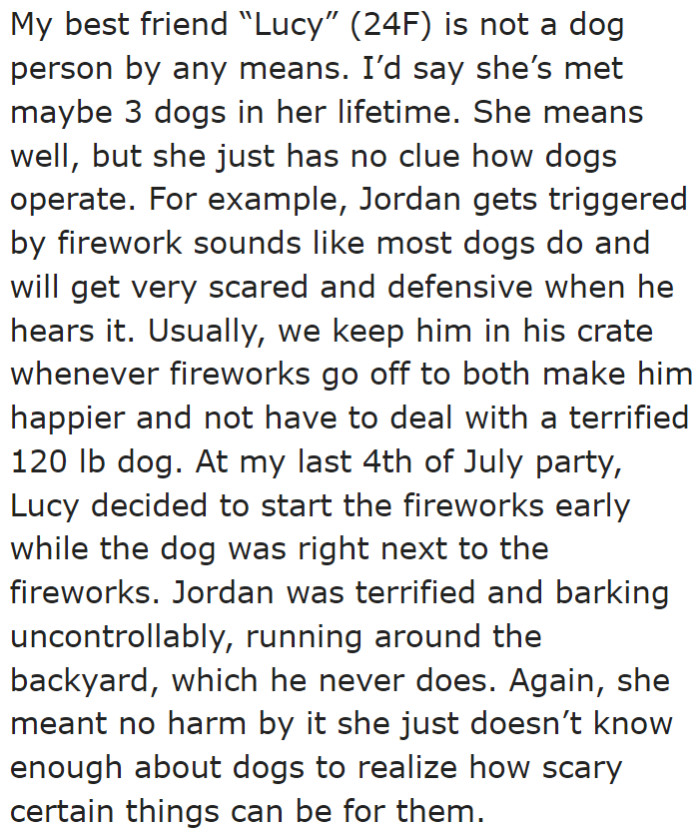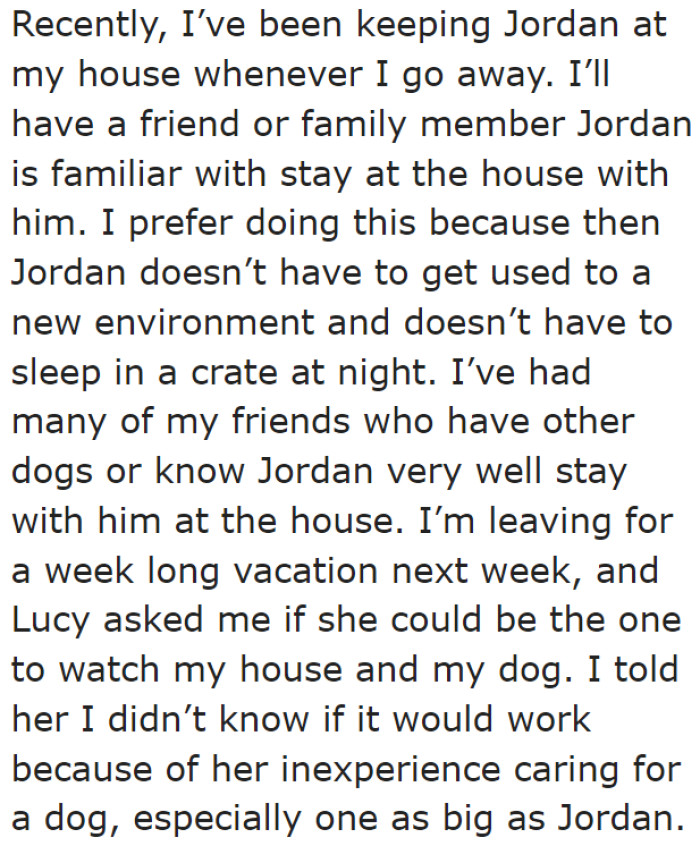Woman Who's Clueless About Caring for Dogs Volunteers to Watch Over Her Friend's Pet, Gets Angry After the Said Friend Didn't Allow Her To
Pet owners always want their fur child to receive the best care, even when they're away on vacation. Some people choose professional sitters, while others prefer to board their pets.
There are also pet owners who ask either their family or friends, as the dog already knows them. If you're going this route, you must ensure that your friend or relative is responsible enough to care for a dog.
Aside from knowing the basics, they need to understand your pet's routine, including feeding times, exercise needs, and any medications or special care required. Remember that a person who volunteers for the job isn't always the best person for the task.
While choosing a friend or family member as a pet sitter may seem like a convenient and cost-effective option, you have to make sure your pet is in good hands, and don't hesitate to ask for updates or check-ins while you're away.
In a thread on the "Am I The A**hole?" (AITA) subreddit, a woman shared that her friend got mad at her.
The reason? She refused to let this friend watch over her Great Dane.
The original poster (OP) wasn't comfortable leaving the task to her friend, who is inexperienced with dogs.
Was the OP wrong for refusing to let her friend watch over her dog while she's away on vacation?

The OP tells the community about her living situation.

She then talks about her friend who isn't too familiar with dogs.

Understanding the Complexity of Pet Care
Dr. Mark Spencer, an animal behaviorist, emphasizes that caring for pets often involves emotional and practical responsibilities.
His research highlights the importance of understanding both the needs of the pet and the caregiver's capabilities.
When individuals volunteer for tasks they aren't prepared for, it can lead to frustration and conflict.
Understanding the Role of Responsibility
This scenario illustrates the complexities of taking on responsibilities, especially when one feels unprepared.
Research shows that the fear of failure can create anxiety, particularly when individuals step outside their comfort zone.
In this case, the woman's lack of experience in caring for a dog may lead to feelings of inadequacy, which can manifest as anger towards the friend for not allowing her to help.
The OP has been asking friends and family to watch over her dog whenever she needs to be away from home.
This time, she's going to be away for a week, so her friend volunteered to pet sit for her dog.

She refused her friend's offer. The OP feels that it wouldn't work, considering her friend is inexperienced with caring for dogs.

The OP's friend got angry at her refusal.

Behavioral psychology suggests that individuals may overcommit due to a desire to please others or fear of disappointing them.
Research indicates that this can result in feelings of resentment when the reality of the situation becomes overwhelming.
Recognizing these patterns can help individuals make more informed choices about their commitments.
Behavioral psychology emphasizes that when individuals feel overwhelmed by responsibilities, they often react defensively.
Studies indicate that this defensiveness can impede learning and growth, particularly in new situations.
Instead of viewing the friend's decision as a rejection, reframing it as a protective measure for the pet's welfare may help alleviate some of the frustration.
Redditors were on the OP's side. They said she was right to reject the offer.

One Redditor shared the effect of fireworks on a dog.

Something does smell fishy here. Does she want the place to herself?

The Importance of Clear Boundaries
Establishing clear boundaries is crucial in any caregiving scenario, especially when it comes to pets.
Dr. Linda Roberts, a psychologist specializing in relationships, notes that boundaries help prevent misunderstandings and protect emotional well-being.
Having open discussions about expectations can create a more positive dynamic between friends.
The Importance of Self-Reflection
Self-reflection can be a powerful tool for understanding one's emotional reactions.
Research in emotional intelligence emphasizes that recognizing and processing emotions can lead to healthier responses in conflict situations.
In this case, taking time to reflect on her feelings about the friend's decision may provide clarity and reduce anger.
You can't really trust an immature friend to do a job that involves greater responsibility.

Other dog owners wouldn't trust the OP's friend either.

What a strange demand.

Psychologists recommend implementing a collaborative approach to caregiving responsibilities.
This includes discussing capabilities before volunteering for tasks and ensuring all parties are on the same page.
Creating a shared understanding of roles can help reduce potential conflicts.
Effective communication is critical in expressing feelings and needs without creating conflict.
Studies show that using non-confrontational language can help convey emotions without escalating tensions.
In this scenario, calmly discussing her feelings of disappointment with her friend might lead to a more productive conversation about responsibilities.
She needs the OP's house for a reason.

This friend will just ignore the dog and turn the OP's home into a party place.

The OP already set the boundary. Her friend needs to respect it.

Exploring Emotional Reactions to Caregiving
Emotions surrounding caregiving can reveal deeper issues, such as fear of inadequacy or rejection.
Research in emotional psychology suggests that these feelings can significantly impact decision-making and interpersonal interactions.
Being aware of these emotions allows for healthier communication and understanding.
Reframing Perceptions of Help
Understanding help as a collaborative effort rather than a competitive one can reshape interactions.
Research indicates that viewing support and assistance as opportunities for growth fosters positive relationships.
In this case, reframing the friend's decision as an opportunity to learn about caring for dogs might empower the woman in future situations.
Redditors can already see through the friend with what the OP revealed.

The friend has plans, and she wants to disguise it as pet sitting.

Advice from a Pro Pet Sitter

Fostering an environment of mutual respect and understanding is essential in caregiving scenarios.
Practicing empathy and validating each other's feelings can enhance relationships and reduce resentment.
Regular check-ins about feelings and responsibilities can promote a more harmonious dynamic.
The friend can't handle a Great Dane.

It's pretty obvious why the friend wants to pet sit despite not having a lot of experience with dogs. The OP mentioned that she has a pool.
It seems the friend got upset over the refusal since her plans to party got ruined. The OP is doing a good job of standing her ground.
Her dog deserves better, so it was only right for her to say no.
Psychological Analysis
This situation highlights the challenges of stepping into new responsibilities and the emotional reactions that can arise. Taking time for self-reflection and engaging in open communication can help navigate feelings and strengthen relationships.
Analysis generated by AI
Analysis & Alternative Approaches
Experts in emotional intelligence stress the importance of self-reflection and communication in navigating feelings of inadequacy and frustration.
According to the American Psychological Association, fostering open dialogue can enhance understanding and collaboration in relationships.
Psychological Analysis
This situation underscores the challenges that arise when individuals take on responsibilities without fully understanding their implications. The emotions involved can lead to misunderstandings and resentment if not addressed openly. Encouraging clear communication and collaboration can significantly improve the dynamics of caregiving arrangements.
Analysis generated by AI
Analysis & Alternative Approaches
Understanding the emotional and practical complexities of caregiving is vital for maintaining healthy relationships.
Research shows that establishing clear boundaries and fostering open communication can significantly reduce conflict and enhance collaboration.
By prioritizing mutual respect and empathy, individuals can navigate these challenges more effectively.



